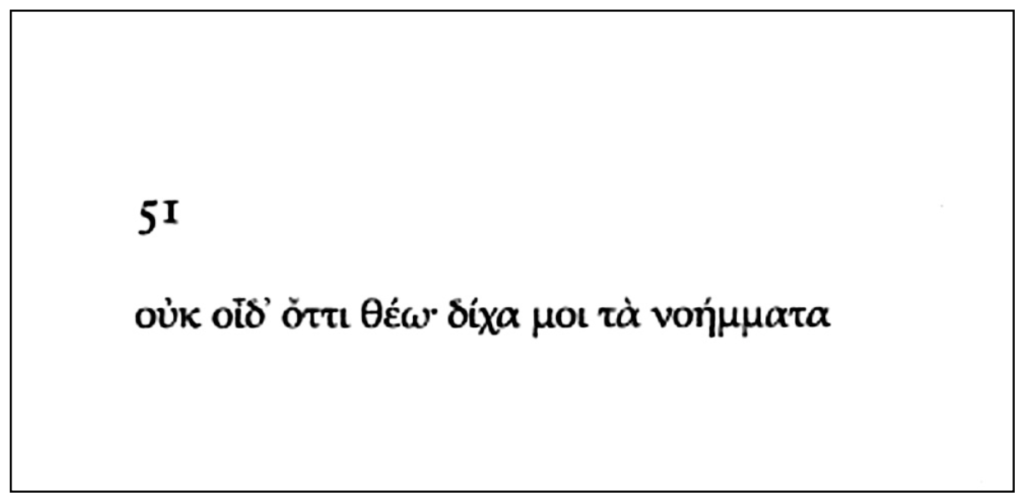
PsychoanalysisLacan Volume 4
Poetry and Prose
Was Sappho Nondisabled?
Lacanian Reading of Fragment 51 by way of Halloween & Written in Fragments on Twitter
The Cyborg Jillian Weise
- Secret. Not Politically Correct Thought: On & around Halloween I need to be in solidarity & company with fellow physically, “visibly” disabled people. This is a much harder time for us than it is for “invisibly” disabled people.
- I did not realize it was bothering me until just now. I thought I was bothered by something else in regards to “secrecy” and disability. But I realized I am bothered by the time of year. And the secrecy. And how.
- It must be quite nice, for invisibly disabled people, to have the opportunity to consent, their own consent, about whether they wish to disclose or not. I do not get that option. I do not get to consent to disclosure. My body does that for me. I am a posteriori disclosed.
- “True. We get ‘the look’–either pity or disgust–before anyone gets the chance to find out what kind of person we are,” Ann_brantingham said.
- Yes. This. And something else beyond the look. Before the look. We get the knowledge that we do not have a choice. We will not be choosing whether we are “out” as disabled or not. That is not our choice.
- “I think that might be a lifelong theme or motif for people with visible disabilities. There are so many things in our lives that we are not given a choice about,” Ann_brantingham said.
- Yes. I am trying to reconcile this. Because I imagine a lurker is simplistically thinking, “Oh this is just internalized ableism.” And that lurker would be correct but also dismissive of something much bigger. I don’t know what it is yet. But I feel myself frustrated by
- discourse wherein I need to pretend that “invisible” disability is “much harder.” Tangentially: I, too, dislike disability hierarchy. But saying that I dislike it often means the next move is to not talk about it at all. And I would like to talk about this particular thing.
- I am going very slow here. On purpose. There is no rush. I will return to share my thoughts on this more later. I am on crip time.
Hours pass.
- I am thinking about Sappho, in particular, Fragment 51, in particular the Greek original. Here is the Greek:

- This very much relates to what I am trying to say. Though I do not know it yet. Here is the translation that Willis Barnstone gives us: “I don’t know what to do. I think yes and then no.”
- I believed this translation. That is, I believed there was a “yes” and a “no” in the original Greek. But I do not know Greek. I thought I was tracing this line in poetry, and I am, but I needed someone to explicate the original Greek. Enter Jordi Alonso.
- Jordi pointed out to me this very important lacuna in my thinking: “Sappho doesn’t actually use the words ‘yes’ and ‘no’ in Fr. 51 which is the one you’re referencing. It’s more like ‘should I or shouldn’t I’ “
- So I asked Jordi, “what is negating the verb tho?” and Jordi pointed to it “So there’s your οὐκ οἴδ’ (I don’t know) and then the phrase after the interpunct (think of it as a semicolon) ‘my mind is divided in two’ ” And so Sappho disclosed as disabled to me.
- No. Not exactly that easy. I had been looking for Sappho to disclose as physically disabled to me. She likes arms, legs, feet, sandals, & etc. She likes them in her fragments. “Are you disabled,” I kept asking Sappho. Someone said “The fragment with the bad knees.” And then …
- I was talking to Amy Gaeta about this & she said, “Yes. She is. Perhaps. Perhaps obviously. She is cognitively, psychiatrically disabled. In the fragments.” I am paraphrasing that conversation.
- But still I thought: No one will believe me. Sappho cannot be disabled. Why? She just cannot be. We would have known it.
- “Maybe Sappho isn’t disabled herself, but I think there could be a case for why her work is disability poetics in form and content– I highly relate my neurodiverse experience to her work,” GaetaAmy said.
- Yes, I agree with you. Maybe she isn’t herself disabled. And also maybe she is actually disabled. And also maybe she herself is saying, “I don’t know,” that is “I don’t know [if I am disabled], that is οὐκ οἴδ’ which is “I don’t know.”
- How does this relate? There is something here abt epistemology. What? I know that I am disabled. And I must know that I know I am disabled. I do not get the chance to be in the liminal. In the extimacy (Lacan) in the metaxy (Greek: μεταξύ).
- “How do I know what I know? What type of knowledge is it? Here it seems more than emotional knowing but psychological affiliation. Extimacy seems related but that’s more pertaining to what we don’t want to admit we like (projection). The Sappho connection is almost more uncanny,” GaetaAmy said.
- Yes, I was trying to make a much simpler point. About negation. But I got hoodwinked by the Symbolic Order.
- There is something here about “middle voice” in ancient languages but I am not yet a linguist whereas I am — yes — “always already” — fine — disabled.
- What was the point I thought it was that I was making? I am always saying to people, “Every disabled person has their own journey and everyone can disclose on their own timeline. On their own terms.” I say this even as it is not true for me. Next is a complex Lacan statement.
- “I think where I am not, therefore I am where I do not think. I am not whenever I am the plaything of my thought; I think of what I am where I do not think to think.” Lacan, Écrits [p?]
- So that’s where I thought I was going. Before Sappho said, “I don’t know [if I am disabled; so stop asking me].”
- How dare I speak for Sappho? Is it a delusion of grandeur? Yes. And it is also a delusion of grandeur to speak for Sappho in these terms: “She was not disabled.”
- Very glad that Jordi said it this way: “there’s your οὐκ οἴδ’ (I don’t know),” that is “there’s your,” that is often in the phrase “there’s your [answer].” And there is something else which substantiates the uncanny Amy Gaeta mentions,
- via Jordi Alonso, who knows Greek, and returning to the fragment: “θέω, which honestly I’ve always seen in physical actually ‘getting out of the way quickly'”
- Sappho is getting out of the way.
